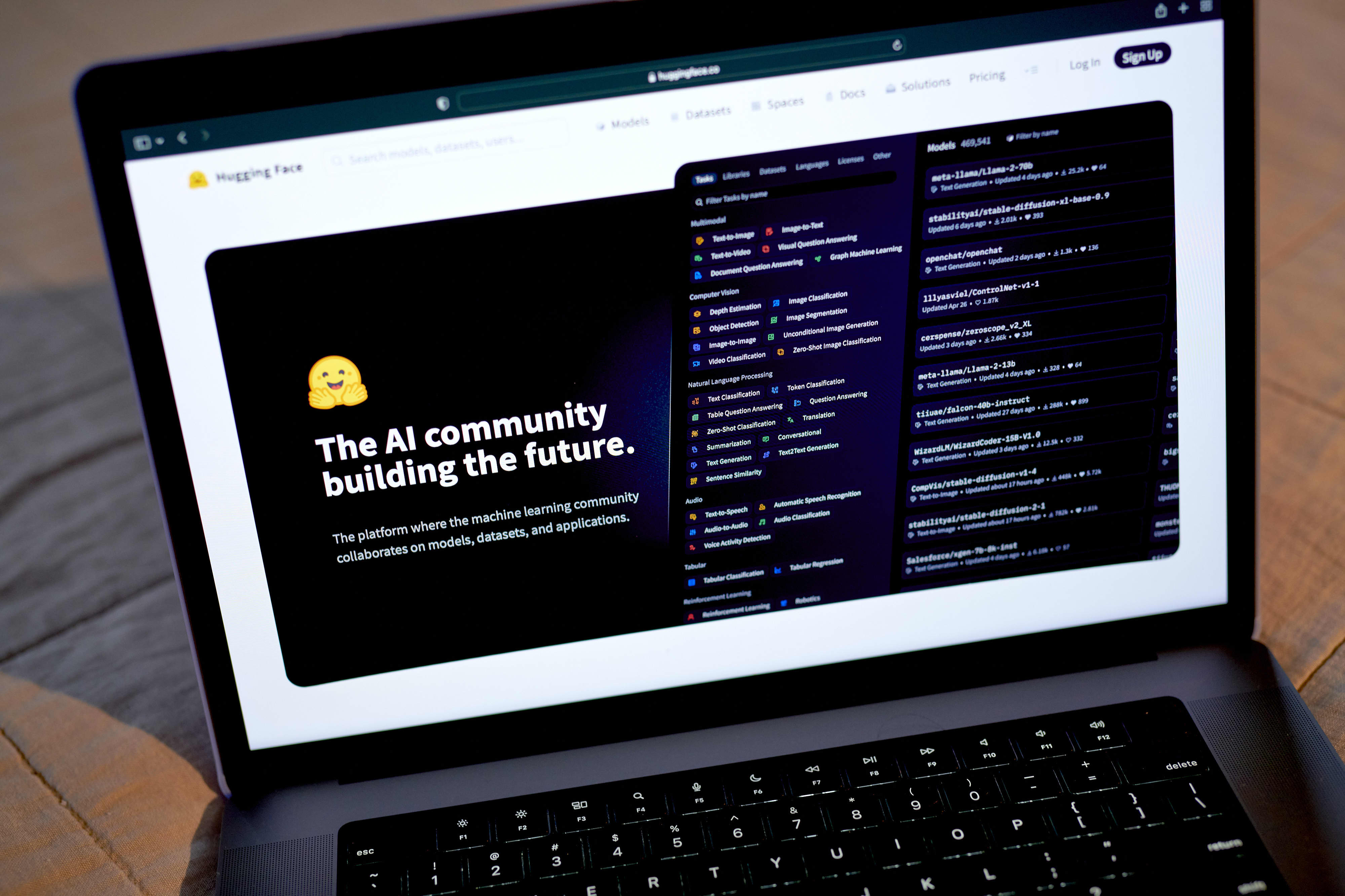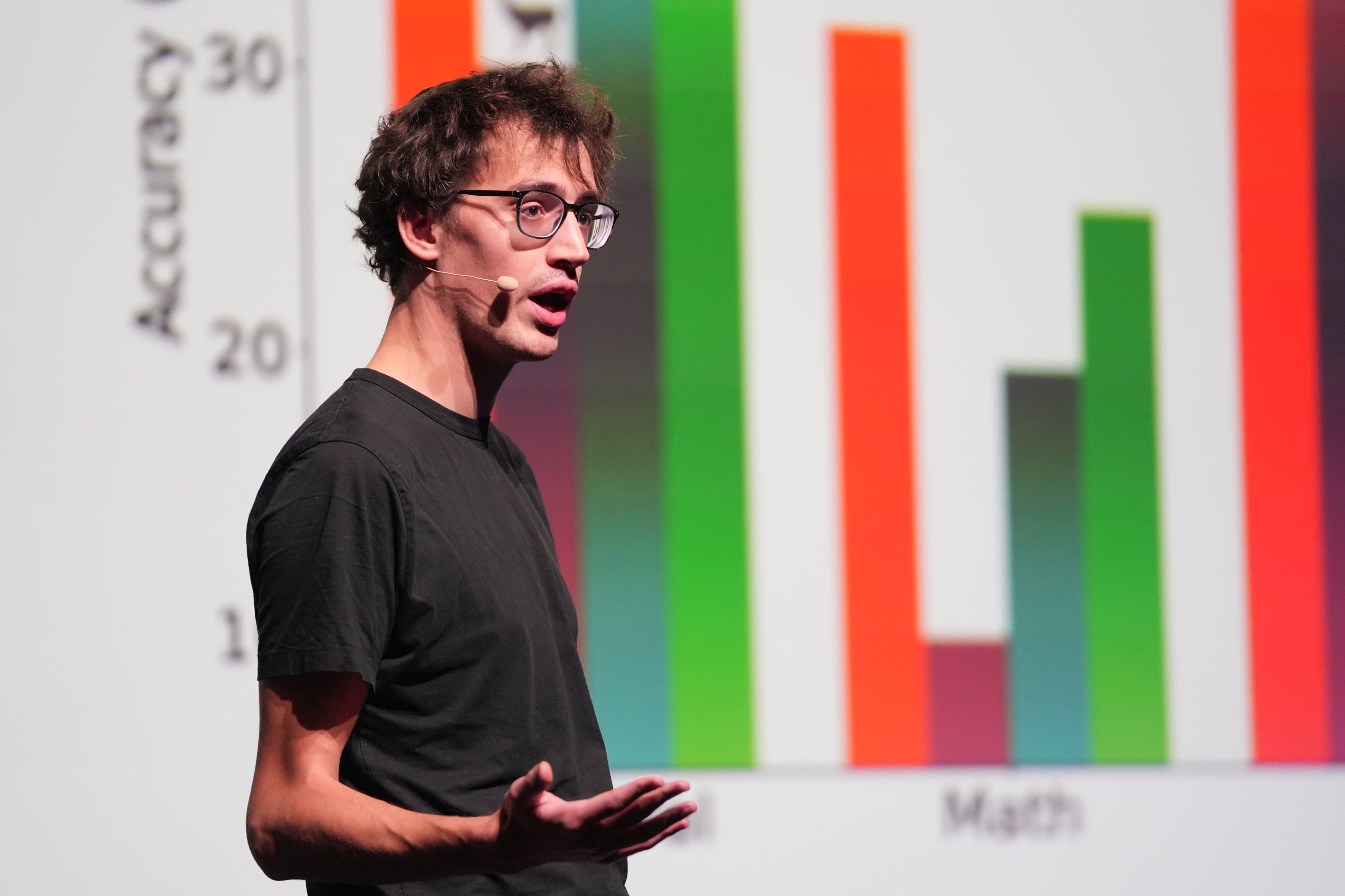
The Hugging Face website on a laptop arranged in New York, US, on Thursday, Aug. 17, 2023. Nvidia announced a partnership with Hugging Face, a popular developer of AI models and data sets, that will add a training service to its website that uses Nvidia DGX Cloud, allowing users to tap the chipmaker's servers to handle their workloads. Photographer: Gabby Jones/Bloomberg via Getty ImagesBloomberg | Bloomberg | Getty Images
Tech giants Salesforce, Qualcomm, Nvidia and high-profile investor Eric Schmidt are pouring investment into open source AI startups that could be winners as the recent OpenAI saga — although now resolved with Sam Altman reinstated as CEO and a new board being composed with the approval of major OpenAI backer Microsoft — has shaken up the market and caused a reassessment of relying on a single, proprietary service for generative AI and concerns about concentration of AI development of a handful of big tech players.
As public market tech giants jockey for leading positions in advanced AI, well-funded open source startups are eyeing expansion as competition intensifies and more enterprises consider adding open models and providers to their generative AI push. “The drama over OpenAI reinforces the need for open source or community models outside a single company,” said Mike Gualtieri, vice president and principal analyst at market research firm Forrester.
OpenAI staff threats to quit, and worries about the startup's ability to continue to function and support the hundreds of startups that had rushed into its ecosystem, highlighted how quickly a competitive landscape can shift, and in unexpected ways. In addition to an offer from Microsoft to join at current compensation, Salesforce CEO and co-founder Marc Benioff offered jobs to any OpenAI talent thinking of departing the company.
“What we want to avoid is only one game in town, a large monopoly operating behind closed doors. This OpenAI saga demonstrates that the ecosystem is too fragile to rely on a single company for its AI needs,” said Delip Rao, an AI research scientist and academic who has worked at Twitter and Google. “We should encourage all companies to build on disruption-proof AI technology that only open source can offer.”
To be clear, big bets made on open source AI pre-date last Friday when news first broke of Sam Altman's removal as OpenAI CEO, and those bets include an open source AI model controlled by one dominant tech company, Meta Platforms' Llama.
Salesforce-invested Hugging Face, named after the popular smiley emoji with a matching logo, is gearing up after a $235 million venture deal at a $4.5 billion valuation in August. The French-American open source AI company has raised a total $400 million from a broad array of 30 tech investors including Qualcomm, IBM, Google, Nvidia, Intel and Sequoia Capital.
“We are not following the Silicon Valley playbook,” said Thomas Wolf, co-founder and CEO of Hugging Face, a central hub connecting developers and researchers to share code and build AI tools together, in an interview that was conducted before the recent OpenAI shakeup. “AI builders are growing superfast, raising and burning money. We are not in that mindset. We've been around for seven years, and didn't need to raise money. We can make plans for the long run without a problem.”
Wolf stressed his firm's contrast to enterprise-controlled and owned software models. “We are unlocking the community to develop AI, to share and build together,” he said. And in a subsequent interview after the OpenAI power struggle began, he referenced the Linux open operating system, a widely used rival to Microsoft's Windows, which he said was never at risk of disappearing because Linus Torvalds (its creator) changed jobs.
Hugging Face has 160 employees and turned cash flow positive early last year, he said, and may make an acquisition after buying machine learning startup Gradio in 2021. “I don't see the market consolidating. Instead, it will fan out.”
This past June, Salesforce Ventures, the company's investment arm, doubled its generative AI fund to $500 million.
“We are excited about innovations in generative AI in an open way, so researchers and developers can collaborate,” said Paul Drews, managing partner at Salesforce Ventures. Competitive leverage is top of mind. “Salesforce could partner with Hugging Face in the future and is in the early days of exploring collaboration,” he said.
Open source and AI governance
Former Google CEO Eric Schmidt is behind Mistral AI, another open source rival to OpenAI's ChatGPT. Founded in France by alums of Alphabet's Deep Mind and Meta, the startup launched in May and within four weeks, picked up $113 million from Lightspeed Venture Partners with other Silicon Valley heavyweights, and several French investors. Mistral AI is raising more funding, reportedly at least $400 million at a $1 billion valuation.
“Open-source development is the only validated way of making software collaboratively, and AI is no different. Governance matters,” said Arthur Mensch, CEO and co-founder Mistral AI, in an interview after the OpenAI news. This November, Microsoft began offering the startup's service on its Azure cloud computing platform.
A third open source AI startup, Poolside AI, recently pulled in $126 million co-led by French telecom and internet billionaire Xavier Niel and U.S. VC firm Felicis Ventures.

Arthur Mensch, founder of Mistral AI, speaks at the ai-Pulse conference at Station F technology campus in Paris, France, on Friday, Nov. 17, 2023.Nathan Laine | Bloomberg | Getty Images
Between Hugging Face, Mistral and Poolside, France — which is making a coordinated government-industry push to be a global AI leader — had three of the top AI startup funding deals in Europe this year. Schmidt is leading the development of a Silicon Valley-like hub for AI research and innovation in the country.
Meanwhile this November, in China, AI investor and former Google president Kai-Fu Lee launched his own contender, 01.AI, funded by his firm Sinovation Ventures and Alibaba. Elon Musk is charging forward with OpenAI rival xAI, which can access data on X and is currently being tested with a select number of users.
Beginning as a chatbot, Hugging Face pivoted to natural language processing (NLP) models, and then built its open source platform for data science and machine learning. Today, Hugging Face counts more than 2 million users, 400,000 models and 77,000 data sets. Most or 90 percent of its services are offered for free while paid projects bring in revenue (undisclosed). Among its customers are IBM and AWS, which use its tools to integrate into their offerings for clients. “Joint efforts can accelerate innovation and the development of on-device AI applications,” said Quinn Li, senior vice president and global head at Qualcomm Ventures, of its recent co-investment in Hugging Face.
“It's pretty clear now that AI is changing the world. We are at the beginning of what AI can tackle,” Wolf said, noting its ability to create music, text and images, and possibly film. “We are covering the whole spectrum of Gen AI.”
Risks and opportunities in open source AI models
Venture capitalist Bill Gurley of Benchmark along with a group of 17 investors and founders submitted a letter to President Biden this month regarding the recent AI Executive Order, noting its potential for restricting open source. They spelled out the importance of open source AI in fostering innovation, encouraging competition and democratizing access to technology, and noted that this community approach to building is what made the Internet successful.
“With open source, developers can collaborate and share knowledge, resulting in more rapid innovation,” said AOL co-founder Steve Case, chairman and CEO of Washington, D.C.-based investment firm Revolution, who recently penned an op-ed for CNBC including this among his keys for strong U.S. AI innovation policy. “Having open source AI allows startups to compete with big tech companies. It levels the playing field so that all companies and developers have access to the same tools,” he said.
While open models are regarded as a fast, transparent and accountable way to innovate, on the flip side they can be viewed as not as safe as proprietary ones because the source code is public, which may invite bad actors. “Open source will reduce some fears, namely by offering transparency, and creating more trust and confidence,” Case said, but he added, “we cannot minimize the risks that could come along with AI and certainly some of those risks are heightened with an open source system.”
An issue in the forefront for these startups that partner with technology giants is whether they can remain neutral in developing open source technology for the community. “If startups get a lot of investment from a tech giant, can they remain neutral?” asked Forrester analyst Gualtieri.
“It is very hard to remain neutral when taking money from strategic investors including Salesforce and Nvidia. “This is a clever balance that Hugging Face and others will have to strike,” said Guarav Tewari, managing director at Palo Alto-based Omega Venture Partners, which has invested in 19 AI-related software companies.
MIT professor and “Superminds” author Thomas Malone said the OpenAI drama illustrates the tension between the power of community, such as concerns about AI safety, and on the other hand, the power of markets such as the desire to increase profits. He said both startups and big tech players can exploit the generative AI market, but early over-confidence has never been a winning strategy during waves of innovation. “In the history of tech, it is hard for dominant players to remain dominant,” he said.
News Related